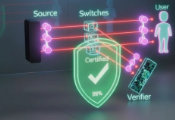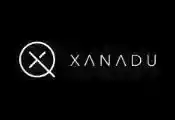IonQ Partners With Oak Ridge National Laboratory, Demonstrating Quantum Power Grid Optimization Advancements
COLLEGE PARK, MD, July 31, 2025 -- IonQ, the leading commercial quantum computing and networking company, announced a new achievement in applying quantum technology to energy grid optimization challenges. Through a collaborative partnership between IonQ, Oak Ridge National Laboratory (ORNL), and the U.S. Department of Energy (DOE), the team has successfully demonstrated that its hybrid quantum-classical computing approach can address the Unit Commitment problem, a critical task for power grid operators.
The Unit Commitment problem involves determining the optimal schedule for power generators to meet electricity demand at minimal cost. This task becomes increasingly complex as power systems scale and generate more energy using dispatchable energy resources (e.g. nuclear plants, natural gas, hydroelectric…etc.) and intermittent sources such as solar and wind.
IonQ and ORNL developed a hybrid approach that combines IonQ’s 36-qubit Forte Enterprise quantum computing with classical computing. Using this hybrid approach, the team found varied solutions for power generation scheduling across 24 time periods and 26 generators.
“This demonstration marks a significant milestone in applying quantum computing to real-world energy challenges. We are proud to be partnering on this ground-breaking work with ORNL and the DOE,” said Niccolo de Masi, CEO of IonQ. “As our systems scale to thousands and millions of qubits, we expect to solve grid optimization challenges at a scale that classic computing methods cannot match.”
The energy sector is increasingly viewed as a key early use case for quantum computing advantages, given its reliance on complex optimization and simulation tasks. According to the U.S. Energy Information Administration, more than 60% of energy used in electricity generation is currently lost, pointing to a significant opportunity for waste reduction through improved planning and computational methods.
This research is part of DOE’s multi-year GRID-Q project, which brings together national laboratories, academic partners, and private-sector companies. ORNL leads the project, with IonQ as one of only two quantum industry partners tasked with developing scalable quantum algorithms for grid operations.
“This case study, completed by ORNL in partnership with IonQ, demonstrated the feasibility of using an ion-trapped quantum computing device to solve the Unit Commitment problem in the power grid,” said Suman Debnath, who led ORNL’s contributions to the project. “As the quantum device scales, concurrent research is intended to test how the application performance can gain a quantum advantage.”
IonQ anticipates that quantum systems with 100 to 200 high-fidelity qubits, which are expected as early as 2026, will be capable of solving grid-scale Unit Commitment problems. The quantum optimization methods demonstrated in this work are applicable to a broad range of industries, including logistics, scheduling, and finance.
This latest announcement builds on the established relationship between IonQ and ORNL. The organizations have partnered on several projects including: noise-tolerant methods to help solve the world’s hardest optimization problems as well as a novel approach to scalable quantum computing. IonQ is also engaged in a separate $22 million project with EPB of Chattanooga that includes optimizing the energy grid.




































